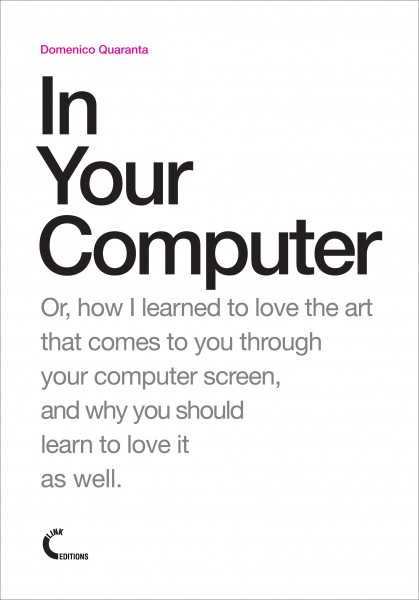Domenico Quaranta: In Your Computer (2011)
Filed under book | Tags: · art, biotechnology, curating, internet, interview, media art, media theory, net art, new media, software art, technology, video games

This book is a collection of texts written by Domenico Quaranta between 2005 and 2010 for exhibition catalogues, printed magazines and online reviews: a pocket version of what the author would save from the universal flood, in a world without computers. It documents most of the fields of research he has focused on critically: from Net Art to Software Art and videogames, from biotechnologies to the debate around curating and the positioning of New Media Art in the contemporary landscape, and back to Net Art again.
This itinerary is traced through a selection of essays, monographic texts and interviews with artists and curators, in no particular order: from Eva and Franco Mattes to Casey Reas, from UBERMORGEN.COM to Oliver Laric, from Cory Arcangel to Tale of Tales, from Jon Ippolito to Gazira Babeli.
As the author writes in the introduction: «We are in the midst of a major change. At the end of the process, not only the way we live, work, travel and communicate, but also the political and economical structures and the social organization we are used to will probably be fundamentally different from how they are now. In art, this change will be complete when the way we make, circulate and understand art is completely different from the way we do it now; and when the way we understand the difference between copies and original and between art and non-art will have adapted to the new models created by the information age. The most we can do now is to take our time, adapt to our new living conditions, be aware of the process going on and look to the most radical propositions around for signals of what is to come. In the awareness that we probably don’t have to look that far: these signals are already here, in our computers.»
Translation and editing: Anna Rosemary Carruthers
Publisher: LINK Editions, Brescia 2011.
ISBN: 978-1-4467-6021-5
180 pages
Licensed under the Creative Commons Attribution-NonCommercial-ShareAlike 3.0 Unported License.
publisher
lulu.com
via Domenico Quaranta
Lisa Gitelman, Geoffrey B. Pingree (eds.): New Media, 1740-1915 (2003)
Filed under book | Tags: · history of technology, media, media archeology, media history, new media, phonograph, stereoscope, telephone

Reminding us that all media were once new, this book challenges the notion that to study new media is to study exclusively today’s new media. Examining a variety of media in their historic contexts, it explores those moments of transition when new media were not yet fully defined and their significance was still in flux. Examples range from familiar devices such as the telephone and phonograph to unfamiliar curiosities such as the physiognotrace and the zograscope. Moving beyond the story of technological innovation, the book considers emergent media as sites of ongoing cultural exchange. It considers how habits and structures of communication can frame a collective sense of public and private and how they inform our apprehensions of the “real.” By recovering different (and past) senses of media in transition, New Media, 1740-1915 promises to deepen our historical understanding of all media and thus to sharpen our critical awareness of how they acquire their meaning and power.
Contributors:
Wendy Bellion, Erin C. Blake, Patricia Crain, Ellen Gruber Garvey, Lisa Gitelman, Geoffrey B. Pingree, Gregory Radick, Laura Burd Schiavo, Katherine Stubbs, Diane Zimmerman Umble, Paul Young.
Publisher MIT Press, 2003
Media in Transition series
ISBN 0262072459, 9780262072458
271 pages
Download (removed on 2013-11-12 upon request of the publisher)
Comment (0)Henry Jenkins, David Thorburn (eds.): Democracy and New Media (2003)
Filed under book | Tags: · cyberspace, democracy, digital divid, hypertext, internet, mass media, new media, politics, technology, virtual communities

Digital technology is changing our politics. The World Wide Web is already a powerful influence on the public’s access to government documents, the tactics and content of political campaigns, the behavior of voters, the efforts of activists to circulate their messages, and the ways in which topics enter the public discourse. The essays collected here capture the richness of current discourse about democracy and cyberspace. Some contributors offer front-line perspectives on the impact of emerging technologies on politics, journalism, and civic experience. What happens, for example, when we increase access to information or expand the arena of free speech? Other contributors place our shifting understanding of citizenship in historical context, suggesting that notions of cyber-democracy and online community must grow out of older models of civic life. Still others consider the global flow of information and test our American conceptions of cyber-democracy against developments in other parts of the world. How, for example, do new media operate in Castro’s Cuba, in post-apartheid South Africa, and in the context of multicultural debates on the Pacific Rim? For some contributors, the new technologies endanger our political culture; for others, they promise civic renewal.
Publisher MIT Press, 2003
Media in Transition series
ISBN: 0262101017, 9780262101011
397 pages
PDF (updated on 2012-7-15)
Comment (0)
